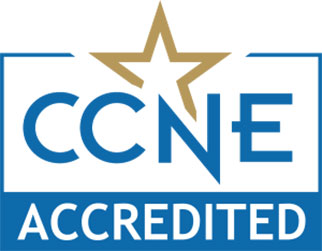Online DNP Overview
Prepare for advanced practice nursing and leadership careers with King University’s online Doctor of Nursing Practice.
Gain a competitive credential that can allow you to advance in your current nursing career, increase your salary, or move into the position you want most. King University’s CCNE-Accredited DNP is an academically rigorous, cohort-based program offered in a part-time, online format. With small class sizes and dedicated faculty, our program is the perfect environment for enriching scholarship and growth. The online DNP strives to:
- Foster a Christian learning environment to help students become thoughtful, resourceful, and responsible professional nurses with a passion for serving.
- Prepare graduates with a scholarly approach to the discipline and a commitment to advancing the profession through the pursuit of knowledge.
- Ensure the quality and alignment of curriculum with national and state standards to provide learning experiences suitable to graduates’ professional levels and roles.
The Online Doctor of Nursing Practice is Designed for…
- Practicing nurses who want to be more competitive as they pursue career advancement
- Nurses seeking education required for certain roles, including leadership and policy development
- Nontraditional learners who want an accessible educational format
Career Outcomes
King University’s online DNP program prepares you to be influential in nursing practice, whether you are managing patient care, leading, teaching, or developing healthcare guidelines and policies. DNP career outcomes include:
- Advanced practice nurse
- Case manager
- Chief nursing officer
- Healthcare policy developer
- Hospital chief executive
- Infection control practitioner
- Nurse educator
- Quality and safety officer
Courses and Requirements
Our accredited doctorate in nursing practice online program requires 36 semester hours for completion over six semesters. Students may elect to progress at a slower pace. Students must complete:
- 1,000 documented post-baccalaureate clinical hours.
- Three virtual colloquia.
- Colloquia 1: two days at the beginning of the program in the fall semester.
- Colloquia 2: two days at the beginning of the second year of study.
- Colloquia 3: two days at the end of the program. All students present final Translational Research Projects.
As a student in the DNP degree program, one must complete all degree requirements within six years of the first semester enrolled as a degree student.
| Course # | Title | Description | Credits |
|---|---|---|---|
| NURS 7000 | Theoretical and Philosophical Foundations of Nursing Practice | Building on the masters-level foundation of knowledge and core concepts of theory and scientific frameworks, this course prepares doctoral students to critique, evaluate and utilize theory within their practice and assists them in the identification of models used to guide research and knowledge development within the discipline. Philosophical foundations of knowledge development in nursing and the natural and social sciences are explored. Relevant theories from bioethics, biophysical sciences, psychosocial science, analytical science and organizational science are also addressed. Emphasis is placed on middle-range theories and concepts used to guide nursing practice. In preparation for their scholarly project, students are expected to demonstrate the ability to conceptualize a theoretical basis for their specialty practice that is comprehensive, holistic, and has the potential to impact patient care delivery models and improve patient outcomes. | 3 |
| NURS 7001 | Nursing Informatics | Building on previous knowledge in healthcare informatics, this course provides an opportunity to examine the forces driving the migration to digital information systems in health care, and the associated desired goals for improvements in value, outcomes, quality, and cost efficiencies. Health information technology and systems are explored for their impact on population health, workflow process improvement and fiscal bearing. The course explores data-driven science within the realm of clinical and translational research to assist the nurse in advanced roles to mine electronic data sets and to prepare for the future, with skills for knowledge management to support evidence-based practice and research application. | 3 |
| NURS 7005 | Applied Statistics for Evidence-Based Practice | This course explores descriptive and inferential statistics with special emphasis on the application of statistics in translational research. The course explores how data are collected, and describes and evaluates research methods that are essential for statistical analysis. Discussions cover measures of central tendency, variability, data representation, correlation and linear regression. A brief discussion of probability theory precedes hypothesis testing, and the course emphasizes hypothesis testing as it relates to different research designs for practice applications. Inferential Statistics that evaluate one sample (e.g.: t-test), two samples (e.g.: independent groups t-test), and two or more samples (e.g.: analysis of variance) are included. The course includes the exploration of research designs that include more than one independent variable (e.g.: factorial designs) and nonparametric statistics. In addition to exploring the application of statistics regarding research methods and designs, exploration of statistical methods pertinent to those utilized in the interpretation of health care data sets such as absolute risk, absolute risk reduction, odds ratio, and number needed to treat are included. | 3 |
| NURS 7006 | Evidence-Based Practice and Translational Research | This course examines the underpinnings of nursing knowledge and the methods by which nursing knowledge is generated. This course explores the role of the nurse scholar in translating evidence into practice. Students will use evidence-based findings to choose an area of interest for their translational research project and begin examining the literature surrounding this topic. After a thorough review of the literature and identification of gaps in the knowledge base, students will begin their project proposal and form their PICOT questions to guide their project. Upon successful completion of the course, the student will be awarded 30 clinical experiential learning hours. | 3 |
| NURS 7011 | Population Health Epidemiology and Data Analysis | This course examines the science of demography and how demographic phenomena affect public health. The focus of demography includes birth rates, death rates, age and gender, structure of populations, population change and distribution. The course prepares the student to define and identify populations and sub-populations of interest, describe the health status and needs of populations, and evaluate services provided to populations by local, regional, and federal public health agencies, as well as population-based private health care organizations. An emphasis on a critical analysis of the evidence-based literature on assessment, development, intervention, and evaluation of population health will assist the student to incorporate successful population health interventions into practice. The student will utilize accountability in determining priorities and evaluating outcomes of population-focused programs. Upon successful completion of the course, the student will be awarded 70 clinical experiential learning hours. | 3 |
| NURS 7012 | Translational Research Project Development | Students must have identified and gained the approval of a community mentor/preceptor for the Translational Research Project with all contracts and site requirements completed prior to starting the Translational Research Project Development course. The student will select a practice setting based on his/her individual interest and expertise and conduct an assessment to identify opportunities for improvement. Building upon formative coursework, students are expected to synthesize theoretical, empirical and clinical knowledge to analyze critical issues in current practice and identify a phenomenon of interest within their area of expertise. The student will analyze data, develop a theory-based project proposal and define a research question(s) for a translational research project addressing a clinically relevant problem within a specific population. An IRB proposal will be submitted for approval of clinical project implementation. This course will include the systematic collection and evaluation of research evidence through a comprehensive literature review and initial project proposal. The student will develop his/her project under the guidance of a faculty member and in conjunction with a community preceptor. Upon successful completion of the course the student will be awarded 180 clinical experiential learning hours. | 3 |
| NURS 7016 | Leadership in Complex Healthcare Systems and Organizations | This course synthesizes leadership theory, behaviors, and organizational models within the context of the health care industry. Models of resource management, change process, gap analysis, strategic planning, and performance excellence are explored and applied. Based on these theories, models, and applications, the student will put the DNP role precepts into practice across complex health care organizations and systems. | 3 |
| NURS 7017 | Healthcare Policy and Advocacy | This course examines the ethical, socioeconomic, political, legal, and power considerations in the development of local, state, and national health policy. This course prepares the student to critically evaluate the unique challenges influencing health care policy, the policy process, and issues concerning social injustice. An emphasis on professional values, advocacy, cultural diversity issues, and political activism assists the student to become an influencer in policy formation and evaluation. A critical analysis of health policy will be completed, with the goal of developing leadership skills to identify, analyze, and influence policy at the local, state, and federal levels. | 3 |
| NURS 7022 | Ethical Issues in Advanced Nursing Practice | This course explores complex ethical issues related to health care in advanced nursing practice. Application of ethical principles and theories are examined and applied through analysis of selected issues and themes at the individual, population, institutional and societal levels. This course prepares the student to analyze, synthesize and evaluate information in order to develop the precepts required to examine ethical dilemmas and to create a decisional framework as required by nurses at the doctoral level. | 3 |
| NURS 7023 | Translational Research Project Implementation | Students must have identified and gained the approval of a community mentor for implementation of the translational research project with all contracts, site requirements and IRB approval completed prior to starting the Translational Research Project Implementation Course. In this course, students will implement the translational project developed in the Translational Research Development course, incorporating knowledge from ethics, biophysical, psychosocial, analytical and organizational sciences. A focus on transformational leadership in the practice setting to deliver advanced-level nursing services to individuals, families, communities, or systems is emphasized. The project will embody ethical, culturally sensitive, fiscally responsible and politically sound principles to improve current and future health care outcomes of identified populations. The student will implement his/her project under the guidance of a faculty member, committee, and in conjunction with a community preceptor. This project will produce a tangible and deliverable scholarly manuscript derived from the practicum immersion experience, which will be completed in the Translational Research Project Evaluation course. Upon successful completion of the course, the student will be awarded 180 clinical experiential learning hours. | 3 |
| NURS 7027 | Theoretical Foundations of Knowledge Development | Theoretical Foundations of Knowledge Development: This course provides the student with an overview of educational theories and principles, the role of the nurse as educator, and educational methodologies to serve a diverse array of learners. The student will explore the relationship associated with societal learning demands, health care outcomes, technological advances, and how evidence-based learning outcomes can be achieved in a variety of settings. | 3 |
| NURS 7028 | Transforming Healthcare Performance through Information Technology | This advanced health informatics course focuses on the critical appraisal of the role of nurse leaders, practitioners, and specialists as they interface with health care information systems for outcomes management and improvement. Advanced data mining skills will be used to evaluate a selected practice issue, provide decision support, identify best practices, and to make evidence-based recommendations for improved patient, system, financial and efficiency outcomes. | 3 |
| NURS 7032 | Translational Research Project Evaluation | Students must have identified and gained the approval of a community mentor for completion of the translational research project with all contracts and site requirements completed prior to starting the translational research project evaluation course. The DNP program culminates in the successful completion of an individual scholarly project that demonstrates synthesis of the student’s work and lays the groundwork for future scholarship. During this course, students will engage in scholarly inquiry to analyze and evaluate their evidence-based project. The completed project will be presented and will be evaluated by the student’s committee. A manuscript for publication is derived from the completion of the translational research project. The student will complete the project under the guidance of a faculty member, committee, and on conjunction with a community preceptor. Upon successful completion of the course, the student will be awarded 180 clinical experiential learning hours. | 3 |
| NURS 7990 | Final Comprehensive Competency Demonstration | Graduate level nursing at the doctoral level requires a final competency demonstration. The demonstration of final competency at the DNP level is embodied in the culminating translational research project. Elements of the translational research project are founded on the American Association of Colleges of Nursing (AACN) Essentials of Doctoral Education for Advanced Nursing Practice. The Essentials document contains outcome competencies deemed essential to all gradates of a DNP program and serves as the guidance and evaluation framework for the DNP graduate’s translational research project. The final competency translational research project is guided by and evaluated against a rubric. Students are required to pass according to the minimum requirement of the School of Nursing. Any student who does not meet the requirement (pass) of their comprehensive assessment of their major field will not graduate until the requirement is met. Pass/fail. | 0 |
- NURS 7007 and NURS 7018 Clinical Experiential Learning (3 credits each)
Admission Requirements
Students applying for the online DNP degree must have a BSN and a current unencumbered RN license in the state where the DNP project will be completed. Applicants must also hold an MSN from an accredited university or a Master of Business Administration, Master of Public Health, master’s in health education, or a master’s in healthcare administration. Additional coursework may be required for those having a master’s degree other than an MSN.
In addition, applicants must have a laptop computer with Microsoft Office 365, wireless Internet, and webcam capability. Microsoft Office 365 is available to all King students to load on their PC or Mac and is accessible at Office.com using their King University credentials. Chromebooks and many tablets will NOT meet the minimum requirements for the SON Programs.
Students applying for an online DNP program must submit the following materials:
- A completed online application.
- An official transcript request form. A scanned copy may be emailed to your enrollment counselor.
- Three letters of reference. At least one must be from a former dean or academic faculty, and one must be from a current or former supervisor. When applying online, you may submit the names and email addresses of individuals offering a recommendation to automate the process.
- A 300-word essay, in current APA format, describing the reason for seeking a DNP.
- A narrative description of your past and current clinical practice.
- A 2–3 page proposal identifying an evidence-based practice problem of focus. This may be a practice improvement issue, a clinical management problem, or an area of clinical research that you will address while in the program. The essay must identify key resources necessary to complete the project.
- A copy of your current curriculum vitae or résumé that includes scholarly accomplishments, participation in professional organizations, and community service.
- A copy of your advanced practice nursing license and specialty certification, if applicable.
- A Verification of Post-Baccalaureate Clinical and Practice Hours Document completed by your graduate nursing program.
- An in-person or electronic interview with nursing faculty.
- An impromptu writing sample at the time of the interview.
- It is highly encouraged but not required to complete a graduate-level statistics course within five years before program matriculation.
- An admission exam is not required, but GRE scores may be submitted.
Have questions about this program or the admissions process? Request information and get connected to one of our knowledgeable enrollment counselors.

The School of Nursing programs are fully approved by the TENNESSEE BOARD OF NURSING, and are a member of the AMERICAN ASSOCIATION OF COLLEGES OF NURSING.
The baccalaureate degree program in nursing, master’s degree program in nursing and Doctor of Nursing Practice program at King University are accredited by the Commission on Collegiate Nursing Education (HTTP://WWW.CCNEACCREDITATION.ORG).

Studying online prepares you for a successful future. Discover a learning format that offers:
- Flexibility and Convenience
- Personalized Academics
- Equal Excellence
- Opportunity for Self Insight
